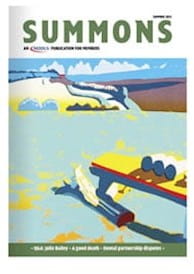IN 1965 a paper was published in The Lancet suggesting a link between folate deficiency in pregnancy and neural tube defects (NTDs) in babies. It reported on a study showing that a higher proportion of mothers giving birth to children with NTDs were folate deficient compared to the mothers of unaffected newborns. Subsequent work in this area led to the promotion of routine folate supplements in pregnant women or those planning to have children, thus drastically reducing occurrence of this tragic condition. The co-author of that paper was a paediatrician named Richard Worthington Smithells.
Smithells was born in Bushey near London, received a public school education at Rugby and went on to study medicine at St Thomas’ Medical School (MB BS Lond 1949). He passed his membership examination in Edinburgh. His interest was in paediatrics (DCH 1950) but he served with the RAMC in Germany for two years of National Service before returning to junior hospital posts in Leeds and Bradford. He spent another period in London as a senior registrar at Guy’s before taking up a consultant post in the Department of Child Health at the University of Liverpool.
Here Smithells set up a congenital abnormality register and noted with growing concern the teratogenic effect of an antiemetic drug taken by pregnant women. In December 1961, thalidomide was withdrawn from the market and Smithells began systematic investigations into the link between use of the drug during pregnancy and birth defects. In 1961 he published a research paper in The Lancet called ‘Thalidomide and malformation in Liverpool’ which confirmed findings from Germany and Australia demonstrating the teratogenicity of the drug. His findings contributed to the establishment of the Committee on Safety in Medicines.
Smithells had also started to investigate possible links between maternal vitamin levels and health of the foetus, with a particular focus on neural tube malformations such as in spina bifida. There was a 50 per cent rise in infant deaths from congenital malformations in Liverpool in the 1950s although infant mortality had fallen by a third.
With Elizabeth Hibbard he explored the link between folate metabolism and birth defect. The question was whether there had been a problem at embryogenesis. After the preliminary publication in The Lancet, trials of folic acid supplements for women before conception and during pregnancy were started and looked hopeful but more studies were needed. Funds came from Action Medical Research and after the Medical Research Council had reported their trials in 1991 the Government acted to ensure flour was fortified with folic acid. NTDs in the foetus soon became rare.
In 1964 Smithells was made medical superintendent at Alder Hey Hospital. His book The early diagnosis of congenital abnormalities had just been published and it described diagnostic methods before the rise of ultrasound investigations. During his time in Liverpool he published papers on the harmful effects of rubella on the foetus following maternal infection. He later demonstrated the value of vaccination in reducing such disabilities.
In the 19th century Smithells’ maternal grandfather was Professor of Organic Chemistry at the University of Leeds and a great uncle (who was a chemist) became pro-vice Chancellor at the university. Smithells carried on this family academic tradition when in 1968 he was appointed Professor of Paediatrics and Child Health at Leeds, a post he held for 20 years.
In his inaugural lecture he spoke of the hazards facing infants as “being born too soon, being born too dangerously, and being imperfectly formed”. It was this last problem that he addressed, not by promoting abortion (the Abortion Act had been passed in 1967) but by prevention of the causes of malformation. To make this work possible he created a laboratory in Leeds to study the effects of drugs and nutrition on the early development of the embryo and foetus. Much of his work was done at the General Infirmary where specialist services could be provided for children. Smithells was not purely an academic but saw that his ideas were translated into action. Driven by his warm, energetic character, a genetic counselling service was set up.
He also actively supported charities such as the NSPCC and wrote a book of playful poems, Alphabet Zoop, for children to be sold in aid of the society. He also gave his spare time to The Thalidomide Trust, the Family Fund and Martin House Hospice for Children and his advice was widely sought by such organisations. In 1985, Action Research for the Crippled Child recognised his contribution with the Harding award.
Meadows' and Smithells' Lecture Notes on Paediatrics was a successful textbook which was described as friendly and useful; he was a good teacher. Concern for the status and training of paediatricians led to his involvement in the establishment of the Royal College of Paediatrics and Child Health. In 2000 he received the International Research Award of the Joseph P Kennedy Foundation. The British Paediatric Association awarded him the the James Spence Gold Medal in 1992.
Smithells married when he was a student and enjoyed family life. His hobbies included walking in the Lake District and bell ringing in church.
Julia Merrick is a freelance writer and editor in Edinburgh
This page was correct at the time of publication. Any guidance is intended as general guidance for members only. If you are a member and need specific advice relating to your own circumstances, please contact one of our advisers.
Read more from this issue of Insight

Save this article
Save this article to a list of favourite articles which members can access in their account.
Save to library